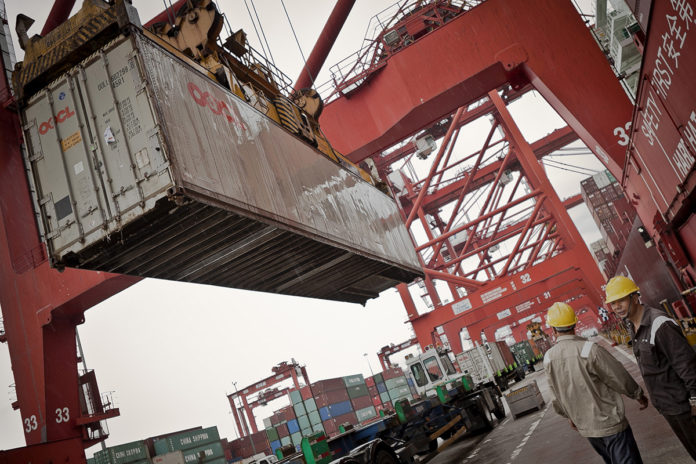“Gradual progress” is being made in “small and medium enterprises [SMEs] from Macau, as well as young entrepreneurs becoming better informed about the functions and opportunities of the platform,” according to the executive representative of the Macao Trade and Investment Promotion Institute (IPIM), Ms. Gloria Batalha Ung.
The comments came at a conference welcoming four Chinese entrepreneurs to share their experiences in trade, development and cooperation with Portuguese-speaking countries. The conference, also focusing on import-export trade, gathered business and government representatives together.
Ms. Ung pointed out the MSAR’s role as a platform for commercial cooperation, with the aim of “accelerating the implementation of such a platform through the construction of three centres” including: the Commercial Services Centre for Small and Medium Enterprises (SMEs) of China and Portuguese-speaking countries; the Distribution Centre of Food Products from Portuguese-speaking countries; and the Conventions and Exhibition Centre for Economic and Trade Cooperation between China and Portuguese-speaking countries.
Within the institution’s role of organizing study and exchange trips for business delegations from Macau and China to Portuguese-speaking countries every year, Ms. Ung noted that a new delegation is set to visit Cape Verde in June to further develop the bipartisan relationship.
Portuguese-language experience
Kicking off the experience session, the President of International Crystals Investment Group Holdings Limited, Deng Haiqiang, spoke of the company’s business in the state of Minas Gerais in Brazil, a mineral-rich territory.
Mr. Deng noted that coming to Macau four years ago and enlisting the support of IPIM, has led to: “the development of closer business ties between the company and Brazil.”
Mr. Deng commented that he built a “crystal palace” in his hometown in Gansu Province using “300 tones of crystal on the floor,” presumably mined from the Portuguese-speaking nation.
Regarding e-commerce development opportunities, the Director of Guangzhou-based Nai Ja Industries Limited, Mr. Chen Jian Cai, lauded IPIM’s support in the development of the group’s e-commerce platform, which helped them “explore and broaden their business abroad.” The company exports batteries to Angola.
Regarding Portugal and Europe, the Vice-minister of the Department of Governmental Affairs at Huawei Technologies Co., Ltd, Chen Nan, said that Portugal was “the first entry door” of Huawei to Europe.
The company currently has eight million clients in Portugal, according to information provided by Mr. Chen.
“The Portuguese government is quite open to foreign companies,” Mr. Chen noted. Speaking about his previous professional experience in Vietnam, Mr. Chen suggested that a formula for good cooperation would be to “always employ local workers.”
He also mentioned that Huawei is developing its research segment in partnership with the University of Lisbon, and that they are planning to create a “Faculty of Information Technology.”
Closing the presentation, a spokesperson for Liu Zhixian, Project director of Longping Hi-Tech Office and President of Longping Hi-Tech East Timor Agriculture Development Co., Ltd. of Yuan Longping High-Tech Agriculture Co., Ltd., presented the company’s strategy for agricultural investment and the development of hybrid rice, honey, coffee, shrimp, and corn, among others.
Longping’s spokesperson emphasized that East Timor is the least developed of the Portuguese-speaking countries, one of the reasons that the company decided to create a centre of development research, and invest in eco-tourism.
“East Timor presents lots of investment opportunities and investment in the country can contribute a lot to the well-being of its people,” Longping’s spokesperson suggested.
Rebuild and link
Speaking to Business Daily on the sidelines of the session, Belarmino Paredes Vieira Barbosa, a representative of the delegation from the General Consulate of the Republic of Angola in Macau, explained that with the implementation of the three centres, Macau is starting to promote Angola’s products in China and in the city, mainly focusing on food.
“The Convention Centre will be the place to exhibit Angolan products available for sale and exchange and this will give a strong boost in our relationship and mainly in trade.”
Mr. Barbosa serves with the Angolan Ministry of Commerce and has spent six years in Brazil, returning briefly to his home country before settling in Macau for the last two and a half years. He points out that Angola is now “advancing with economic diversification,” explaining that many years of war have broken down the country’s infrastructure and economy, and that falling oil prices – Angola’s main export commodity – are creating other difficulties.
“China has granted us loans that we are using to recover the infrastructure destroyed during the war and to diversify the economy, for instance, the agriculture and the industry.”
When asked if Angola has benefitted from the Sino-Luso Forum, by selling goods to China, the representative explained that the country’s current financial situation is not very favourable to this type of investment. “Because China is so to speak self-sufficient, at this moment, we need China more than China needs us,” stated Barbosa.
He added, however, that because Macau acts as “an entry point for goods from Angola and other Portuguese-speaking countries” to the Chinese market, it is incentivizing exchange. The main challenge, he explained, is passing the “high-standard” quality controls that China sets for allowing imports.
“This will be the first step to be achieved,” he acknowledged.
Visiting Macau for the first time, and sitting in on the session, was Luciano Medeiros, Executive Director of NordMarket, a distributor in Brazil. The businessman noted that the opportunity to visit followed an invitation from José Alves, the dean of the Faculty of Business and Leadership at the University of Saint-Joseph, whom he met in Angola last summer.
Mr. Medeiros explained that NordMarket is currently only operating within the domestic market and is seeking to diversify its business, looking potentially to the MSAR.
“We are doing a prospection of Macau’s market for the import and distribution of Brazilian tropical fruits, mangoes, pineapple, avocados, bananas, and so on,” noted Medeiros, who added that the company is initially targeting the Macau market, but not yet focusing on the mainland.
























